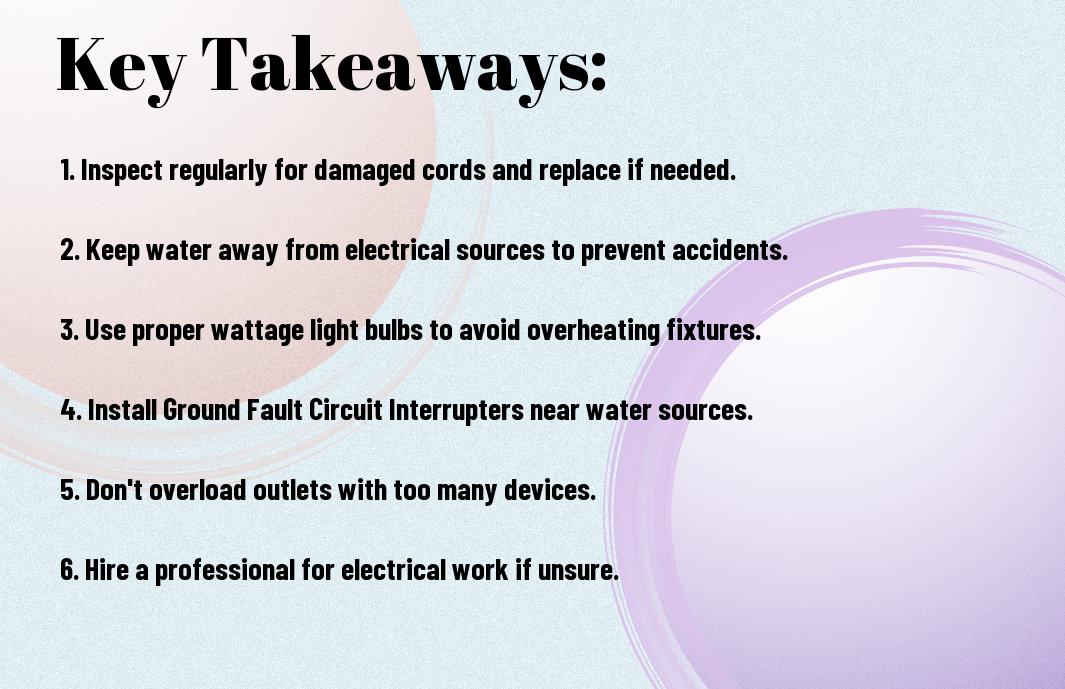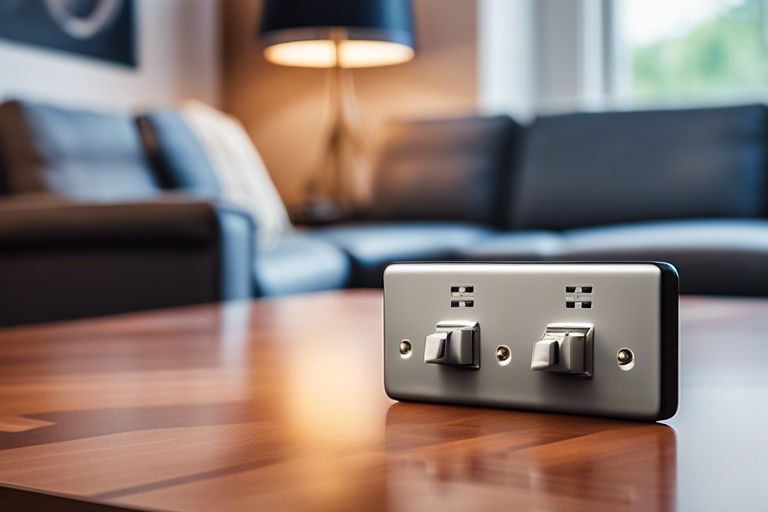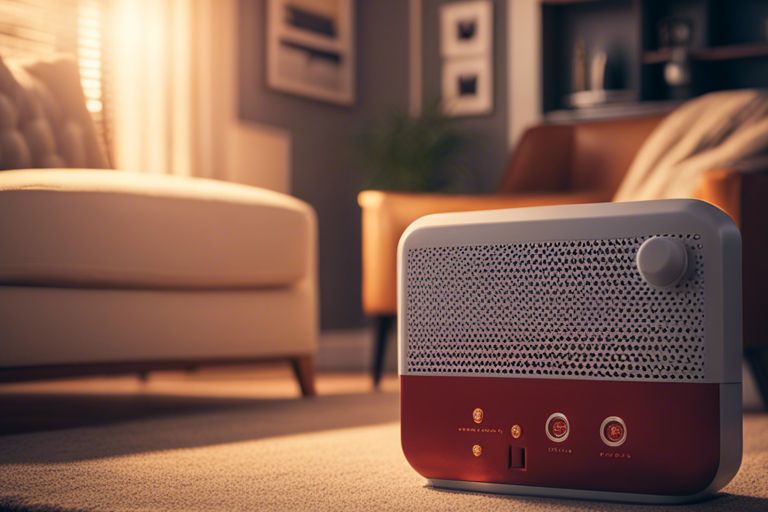Just like a seasoned detective, uncover the hidden dangers lurking in your home with these electrical safety tips to shield your family from potential hazards. Learn how to prevent common electrical mishaps and keep your home safe by visiting Electrical Safety at Home: Preventing Common Hazards. Don’t let electrical issues turn your home into a crime scene – stay informed and stay safe!


Identifying Electrical Hazards
While electricity is a modern necessity in our homes, it also poses various safety hazards if not managed properly. Identifying these hazards is crucial to protecting your home and loved ones from potential dangers.
Common Causes of Electrical Fires
Common causes of electrical fires in homes include overloaded circuits, damaged wires, faulty outlets, and outdated electrical systems. It is crucial to be mindful of warning signs such as flickering lights, frequent tripped circuit breakers, or burning odors, as these could indicate potential fire hazards. Regular inspections by a qualified electrician can help identify and address these issues before they escalate.
Hidden Dangers in Your Home
Any home can have hidden electrical dangers that may not be immediately apparent. Outdated wiring, DIY electrical work, and using extension cords as permanent solutions are common culprits. These hidden dangers can increase the risk of electrical fires and pose a threat to your home’s safety. It is necessary to prioritize electrical safety and address any potential hazards promptly.
Electrical hazards in the home can arise from various sources, including faulty appliances, improper use of extension cords, and overloaded circuits. Being vigilant and proactive in identifying and addressing these hazards is key to maintaining a safe living environment for you and your family.
Safe Practices for Electrical Devices
Some of the most common electrical hazards in homes are related to the misuse of electrical devices. By following safe practices, you can protect your home and prevent accidents.
Proper Use of Extension Cords
Safe use of extension cords is crucial in preventing electrical fires and shocks. Always make sure that the extension cord is in good condition without any visible damage or frays. Do not overload the extension cord with multiple appliances as it can overheat and cause a fire hazard. When using extension cords, avoid running them under carpets or rugs, which can cause overheating.
Safe Plugging and Unplugging
Devices should be plugged and unplugged with caution to prevent electrical hazards. When plugging in appliances, make sure your hands are dry and you are not standing on a wet surface. Pull the plug, not the cord, when unplugging devices to avoid damage to the cord.
Understanding the correct way to handle electrical devices can go a long way in ensuring the safety of your home and loved ones. By following simple guidelines, you can minimize the risk of electrical accidents and create a safer living environment.
Avoiding Overloaded Outlets
With the increasing number of electrical gadgets in households today, it’s easy to overload outlets, leading to overheating and potential fires. To avoid this, make sure not to plug too many appliances into one outlet. Use power strips with built-in surge protectors to accommodate multiple devices safely.
Proper distribution of electrical load among outlets in your home is crucial to prevent overloading and reduce the risk of electrical hazards. Be mindful of the power requirements of your appliances and distribute them accordingly to keep your home safe.
Electrical Safety in the Kitchen
Your kitchen can be a hot spot for electrical hazards. From all the appliances to the presence of water, it’s crucial to be extra cautious in this area of your home.
Safe Use of Kitchen Appliances
One of the most important electrical safety tips in the kitchen is to ensure you are using your appliances properly. Always follow the manufacturer’s instructions for each device, and never overload electrical outlets. Make it a habit to unplug appliances when they are not in use to prevent any potential accidents.
Preventing Electrical Shocks near Water
One of the biggest risks in the kitchen is the combination of electricity and water. One way to prevent electrical shocks near water sources is to make sure all outlets near sinks or other water sources are equipped with ground fault circuit interrupters (GFCIs). These devices can quickly cut off power in case of a short circuit, reducing the risk of electric shock.
Plus, always ensure that your hands are dry before touching any electrical appliances or switches near water sources. It’s also a good idea to keep all electrical cords away from water and never plug in or unplug devices with wet hands to avoid any electric shocks.
Childproofing Your Home
Many parents understand the importance of childproofing their homes to keep their little ones safe from electrical hazards. One of the vital steps in childproofing is securing electrical outlets with covers and locks to prevent children from inserting objects into them.
Outlet Covers and Locks
Locks on outlets can prevent children from accidentally getting shocked by inserting objects into the sockets. Outlet covers are also vital to block access to unused outlets, reducing the risk of electrical accidents. Remember to choose covers that are difficult for small children to remove but easy for adults to access when needed.
Securing Heavy Furniture and Appliances
Any heavy furniture or appliances in your home should be secured to prevent tipping and causing potential electrical hazards. Anchor bookshelves, TV stands, and other furniture to the wall to avoid them from falling over and damaging electrical cords or outlets.
With these childproofing measures in place, you can create a safer environment for your little ones to explore and play in your home without the worry of electrical hazards.
Outdoor Electrical Safety
Unlike indoor electrical safety, outdoor electrical safety comes with its own set of challenges and hazards. It’s crucial to take extra precautions when dealing with electricity outside your home to prevent accidents and injuries. Here are some crucial tips to ensure the safety of your outdoor electrical systems:
Safe Use of Outdoor Lighting and Decorations
Outdoor lighting and decorations can enhance the ambiance of your outdoor space, especially during festive seasons. However, it’s vital to use them safely to avoid electrical hazards. Make sure all your outdoor lighting and decorations are rated for outdoor use and are plugged into ground fault circuit interrupters (GFCIs) to prevent electric shocks. Inspect these items regularly for any signs of damage and replace them if needed to maintain safety.
Avoiding Electrical Shocks near Pools and Water Features
Electrical shocks near pools and water features can be extremely dangerous, as water is a conductor of electricity. To prevent shocks and potential electrocution, ensure that all electrical appliances, outlets, and devices near pools or water features are installed at a safe distance away. Consider hiring a professional electrician to inspect and install any electrical components near water to avoid any mishaps.
near Pools and Water Features: It’s crucial to be extra cautious when using electrical devices near pools and water features. Ensure that all appliances are at a safe distance and that outlets are equipped with ground fault circuit interrupters (GFCIs) to automatically cut off power in case of a short circuit or electrical surge. Regularly check the condition of electrical cords and devices, and never handle them with wet hands to prevent any accidents.
*This blog post is meant for informational purposes only and should not be taken as professional advice. If you have specific electrical concerns, please consult with a certified electrician.

Emergency Preparedness
Once again, it’s crucial to be prepared for emergencies in your home. Taking the time to plan and equip yourself with the right tools can make a significant difference in protecting your family and property.
Having a Fire Extinguisher and Knowing How to Use It
For the event of a small fire breaking out in your home, having a fire extinguisher handy can be a lifesaver. It’s vital not only to have one but also to know how to use it properly. Make sure to keep the fire extinguisher in a visible and easily accessible location and ensure that all family members know its whereabouts and how to operate it in case of an emergency.
Creating an Emergency Escape Plan
Any household should have a well-thought-out emergency escape plan in place. This plan should include designated escape routes from each room in the house, a meeting point outside, and practice drills to ensure that everyone knows what to do in the event of a fire or other emergency. Sit down with your family members and discuss the escape plan, making sure that everyone understands their roles and responsibilities.
Having a solid emergency escape plan can make a significant difference in ensuring everyone’s safety. It’s important to practice the plan regularly, especially if you have children or elderly family members in the household. By being prepared and knowing what to do in an emergency, you can minimize the risks and protect your loved ones and your home.
Conclusion
Ultimately, it is crucial to prioritize electrical safety in your home to avoid potential hazards. By following the simple tips mentioned in this article, such as regular inspections, avoiding overloading outlets, and using extension cords properly, you can protect your home and loved ones from dangerous electrical incidents. Be mindful of, a little precaution can go a long way in preventing disasters.
So, take the time to assess your home’s electrical setup and make any necessary changes to ensure a safe environment. By staying informed and implementing these safety measures, you can enjoy peace of mind knowing that you have taken the necessary steps to protect your home from electrical hazards.
FAQ
Q: Why is electrical safety important?
A: Electrical safety is important because it helps prevent accidents, fires, and injuries in your home. By following safety tips, you can protect your home and loved ones from potential electrical hazards.
Q: How can I protect my home from electrical hazards?
A: You can protect your home from electrical hazards by keeping cords and wires organized, avoiding overloading outlets, using power strips with surge protectors, and having your electrical system inspected regularly.
Q: What are the common electrical hazards in a home?
A: Common electrical hazards in a home include frayed wires, overloaded circuits, damaged outlets, water near electrical appliances, and using incorrect wattage light bulbs.
Q: How can I prevent electrical fires in my home?
A: To prevent electrical fires in your home, make sure to unplug appliances when not in use, avoid running cords under rugs or furniture, never tamper with electrical panels, and install smoke detectors on every floor.
Q: Is it safe to DIY electrical repairs at home?
A: It is not recommended to DIY electrical repairs at home unless you have the proper knowledge and training. Electrical work should be done by licensed professionals to ensure safety and compliance with regulations.
Q: How can I safely use electrical appliances in my home?
A: To safely use electrical appliances, make sure they are in good condition, keep them away from water sources, unplug them when not in use, and follow the manufacturer’s instructions for maintenance and operation.
Q: What should I do in case of an electrical emergency at home?
A: In case of an electrical emergency at home, such as a power outage, sparking outlet, or burning smell, shut off the power at the main breaker, unplug appliances, and call a licensed electrician for assistance.


2 thoughts on “Electrical Safety Tips – Protect Your Home from Hazards”
Comments are closed.